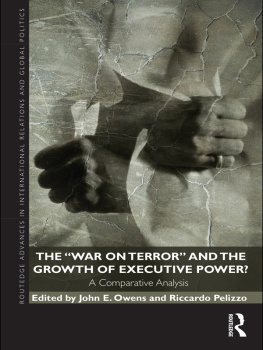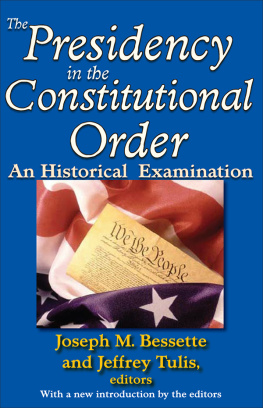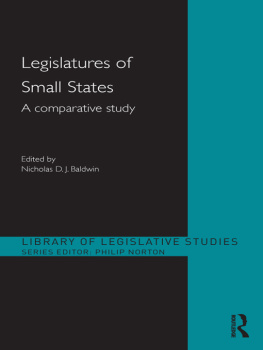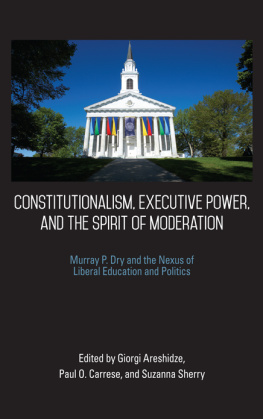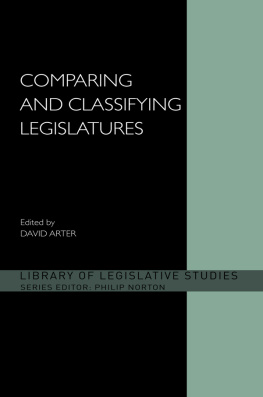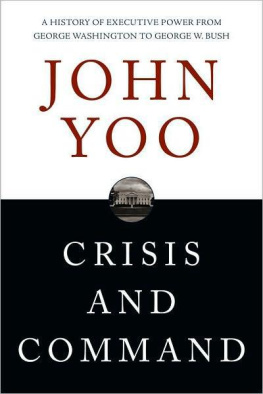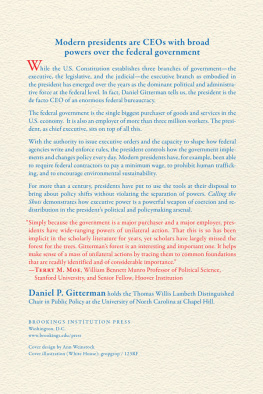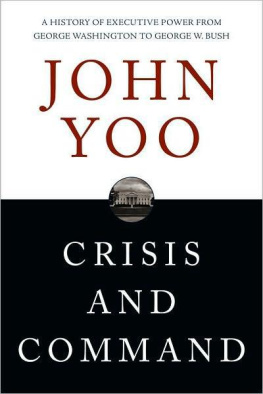The War on Terror and the Growth of Executive Power? A Comparative Analysis is an invaluable cross-national study of the balancing of institutional forces in responding to terrorism. John Owens and Ricardo Pelizzo have brought together an outstanding array of scholars to inquire as to the institutional equilibrium as that has evolved and the causes of it in systems as diverse as the United States, the United Kingdom, Russia, Australia, Canada, Israel, Italy, and Indonesia. Owens and Pelizzo have assessed the institutional responses in the USA and Italy, respectively, and they have combined to write a notable introduction to this book. What is most remarkable is the range of responses that has occurred across these varied political systems as well as the frequently counter-intuitive nature of the responses. For those interested in the dynamics of comparative constitutionalism under duress and of inter-institutional relationships, The War on Terror and the Growth of Executive Power is as essential as it is enlightening.
Bert A. Rockman, Purdue University; co-editor of Presidential Leadership: The Vortex of Power; The George W. Bush Presidency: Appraisals and Prospects; Institutions and Democratic Statecraft; and Do Institutions Matter? Government Capabilities in the U.S. and Abroad.
In a timely and original book, the authors merge together two traditionally separate literatures to assess in a number of important cases the impact of extraordinary critical events, such as terrorist attacks, on the domestic relationships between the executive and legislature. The reaction of democratic institutions is brilliantly singled out and shows, contra Carl Schmitt, that critical events do not always lead to an erosion of democratic quality.
Leonardo Morlino, Jean Monnet Professor of Political Science, Instituto Italiano di Scienze Umane, Florence; President of the International Political Science Association, and author of Assessing the Quality of Democracy and Rule of Law and Democracy.
A well-focused, highly informative and nuanced comparative study of shifting executive-legislative relations during the first years of the US-led war on terror. John Owens and Riccardo Pelizzo are to be congratulated for bringing together competent contributors writing on eight cases, including not only the US and the UK, but also the less frequently covered Russia, Australia and Indonesia. They help to understand why in some cases executives were less successful in loosening parliamentary controls over their often-problematic conduct. The book offers plenty of material to advance theory, but also to mount a critique of some of the excesses of executive power in response to jihadist extremism.
Christoph O. Meyer, Kings College, London. Editor of Europes Response to International Terrorism and author of The Quest for a European Strategic Culture
Taking advantage of the research opportunity presented by world-wide terrorist attacks, this volume examines the resulting balance of executive-legislative relations through both a multi-country and longitudinal research design. While the executive gained power over the legislature in Russia, the United Kingdom, and the United States, the results were different in Australia, Indonesia, Israel and Italy. This readable set of essays on eight political systems differing greatly in constitutional structure, democratic stability and religious identities, highlights the utility of real time comparative research in a global age.
David M. Olson, Co-Director of the Center for Legislative Studies, University of North Carolina. Author of Democratic Legislative Institutions: A Comparative View
The War on Terror and the Growth of Executive Power?
The 9/11 attacks on New York and Washington prompted a global war on terror that led to a significant shift in the balance of executivelegislative power in the US towards the executive at the expense of the Congress.
In this volume, seasoned scholars examine the extent to which terrorist threats and counter-terrorism policies uniformly led to the growth of executive or government power at the expense of legislatures and parliaments in other political systems, including those of Australia, Britain, Canada, Indonesia, Israel, Italy and Russia. The contributors question whether the crises created by 9/11 and subsequent attacks, led inexorably to executive strengthening at the expense of legislatures and parliaments. The reported research finds that democratic forces served to mitigate changes to the balance of legislative and executive power to varying degrees in different political systems.
This book will be of interest to students and researchers of Comparative Government Politics and International Politics.
John E. Owens is Professor of United States Government and Politics at the University of Westminster and Faculty Fellow in the Centre for Congressional and Presidential Studies at the American University in Washington, DC.
Riccardo Pelizzo is a Research Fellow at the Centre for Governance and Public Policy at Griffith University.
Routledge Advances in International Relations and Global Politics
1 Foreign Policy and Discourse Analysis
France, Britain and Europe
Henrik Larsen
2 Agency, Structure and International Politics
From ontology to empirical enquiry
Gil Friedman and Harvey Starr
3 The Political Economy of Regional Co-operation in the Middle East
Ali Carkoglu, Mine Eder and Kemal Kirisci
4 Peace Maintenance
The evolution of international political authority
Jarat Chopra
5 International Relations and Historical Sociology
Breaking down boundaries
Stephen Hobden
6 Equivalence in Comparative Politics
Edited by Jan W. van Deth
7 The Politics of Central Banks
Robert Elgie and Helen Thompson
8 Politics and Globalisation
Knowledge, ethics and agency
Martin Shaw
9 History and International Relations
Thomas W. Smith
10 Idealism and Realism in International Relations
Robert M. A. Crawford
11 National and International Conflicts, 19451995
New empirical and theoretical approaches
Frank Pfetsch and Christoph Rohloff
12 Party Systems and Voter Alignments Revisited
Edited by Lauri Karvonen and Stein Kuhnle
13 Ethics, Justice & International Relations
Constructing an international community
Peter Sutch
14 Capturing Globalization
Edited by James H. Mittelman and Norani Othman
15 Uncertain Europe
Building a new European security order?
Edited by Martin A. Smith and Graham Timmins
16 Power, Postcolonialism and International Relations
Reading race, gender and class
Edited by Geeta Chowdhry and Sheila Nair
17 Constituting Human Rights
Global civil society and the society of democratic states

